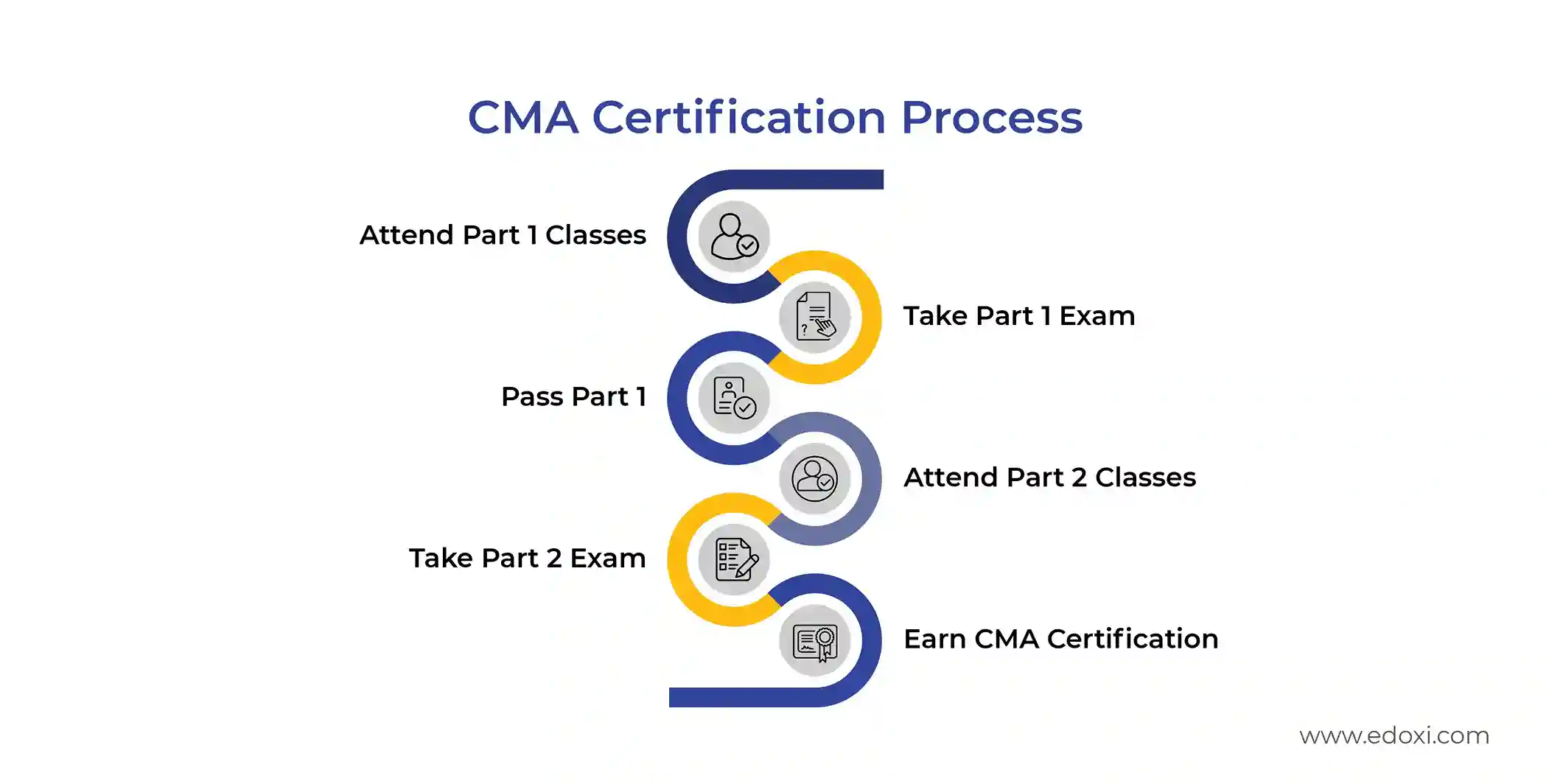Edoxi’s 120-hour Certified Management Accountant (CMA) Course in Qatar is designed to fully prepare you for the CMA exam. The course covers CMA Part 1 and Part 2 with module-wise coaching and regular mock tests. You will learn financial reporting, budgeting, and forecasting. You will also gain an in-depth understanding of cost and performance management. The training includes group discussions, case studies, and hands-on practical activities. This course prepares you for roles such as financial analyst, cost accountant, finance manager, or controller. Enrol now to earn your global CMA certification and step into high-demand finance roles in Qatar.
Edoxi Training Center’s Certified Management Accountant (CMA) training provides comprehensive knowledge in financial planning, management accounting, risk management, internal controls, and budgeting. Our 120-hour intensive training provides in-depth knowledge in monitoring performance indicators and implementing cost management practices through hands-on activities.
The CMA certification is highly valued across all industries, where strategic financial expertise plays a critical role in achieving success. Edoxi’s CMA Course equips participants with the essential skills and knowledge needed to advance in diverse and competitive sectors. We ensure the CMA aspirants acquire the skills to excel in global management accounting. Our expert trainers will guide you effectively through the CMA Certification process.
The CMA certification process involves a structured progression through key steps. Participants start by attending classes for Part 1, where they build foundational knowledge in financial management and accounting. After completing the classes, they appear for the Part 1 exam and must achieve a passing score to proceed.
Upon passing Part 1, participants advance to Part 2, which involves attending classes focused on advanced management accounting and decision-making concepts. Following the Part 2 classes, participants take the corresponding exam to demonstrate their expertise. Successfully passing both exams earns candidates the globally recognized CMA certification, signifying their proficiency in financial management and strategic accounting. The graphical representation of the CMA Certification process is given below.

The Certified Management Accountant (CMA) Exam is a prestigious and globally recognised certification. CMA is offered by the Institute of Management Accountants (IMA). The following table provides an overview of the CMA Certification exam.
| Exam Criteria | Details |
| Exam Format | Two parts, 4 hours each (3 hours MCQ + 1-hour essays). |
| Questions | Each part includes 100 multiple-choice questions and 2 essay questions. |
| Passing Score | Candidates must score 360 out of 500 on Part 1 to proceed to Part 2 and also on Part 2 to earn certification. |
| Prerequisites | Bachelor's degree or professional qualification and IMA membership. |
| Certification Validity | Lifetime (with ongoing CPE requirements). |
| Recertification | 30 hours annual CPE, including 2 hours of ethics training. |
You will gain access to CMA guides, textbooks, mock exams, and extensive practice test banks designed for complete mastery of exam content.
You will engage in collaborative group discussions and hands-on problem-solving exercises that will strengthen your financial analysis and decision-making skills.
We conduct practice tests using multiple-choice questions and essay simulations tailored to match CMA examination standards and requirements.
We provide flexible classroom or online sessions, with weekend timings that accommodate your work-life balance seamlessly.
We offer specialized e-books to deepen your understanding of financial management strategies.
We ensure personalized guidance and an enhanced educational experience tailored to your academic needs.
Accounting Graduates and Students seeking a globally recognized certification to build a solid foundation in management accounting and financial expertise.
Business Managers aiming to enhance their financial leadership capabilities and implement effective strategies for organisational success.
Entrepreneurs looking to adopt advanced financial strategies, improve decision-making, and drive sustainable business growth.
Financial Analysts who want to deepen their knowledge and looking for a career transition into strategic financial management roles.
Accountants specializing in cost management who wish to enhance their skills and unlock greater career opportunities.
Aspiring Financial Leaders looking to advance into senior leadership roles in financial management and strategic decision-making within diverse industries.
Along with theoretical knowledge, we provide thorough hands-on activities in Management Accounting that will help you prepare for challenging roles in finance. Check out the hands-on activities included in our curriculum.
Participate in group discussions to analyze and explore key financial concepts.
Practice essay questions and multiple-choice questions aligned with CMA exam standards.
Engage in problem-solving exercises to strengthen financial analysis and decision-making skills.
Access detailed study guides, mock exams, e-books, and additional resources for thorough exam preparation.
Edoxi’s CMA Training helps you achieve target scores for all the major CMA exams. Obtaining CMA certification significantly enhances career opportunities in financial management, leading to high-paying job roles. The following are the key outcomes of our CMA Course,

Get expert assistance in getting your CMA Course customised!
Here’s a four-step guide to becoming a certified CMA professional.
Do You Want to be a Certified Professional in CMA?
Here’s why students and professionals choose Edoxi for CMA Training in Qatar
We offer exam-oriented coaching, ensuring all participants thoroughly understand key concepts.
You will gain insights from finance professionals who provide practical knowledge in management accounting.
We provide detailed study guides, textbooks, mock exams, and test banks for thorough exam preparation.
We ensure personalized attention and an engaging learning experience for all learners.
We conduct discussions and problem-solving activities that enhance your analytical and accounting skills.
Our weekend classes are designed to help balance professional commitments with effective CMA preparation.

Our mentors are leaders and experts in their fields. They can challenge and guide you on your road to success!

Lahiru Prasanna Silva
Lahiru Prasanna Silva is an expert CMA trainer at Edoxi Training Institute, Dubai. He has over 20 years of practical experience in the finance industry and 18 years of dedicated training expertise.Throughout his career, he has successfully trained more than 20,000 students, equipping them with the skills and knowledge needed to excel in their professional journeys.
His deep understanding of finance and passion for teaching have made him a trusted mentor for aspiring CMA candidates.With a special interest in teaching, Lahiru combines his core expertise in education with his extensive finance background to deliver comprehensive training programs. His commitment to student success ensures that participants gain both theoretical knowledge and practical insights, enabling them to excel in their CMA certification exams and build successful careers in financial management.
Here is the list of other major locations where Edoxi offers CMA Certification Course
Candidates should have a bachelor's degree in finance/accounting. Basic knowledge of financial principles, accounting concepts, and business management is required.
The following table consists of key details of the CMA exam,
| Exam Criteria | Details |
| Exam Format | Two parts, 4 hours each (3 hours MCQ + 1-hour essays). |
| Questions | Each part includes 100 multiple-choice questions and 2 essay questions. |
| Passing Score | Candidates must score 360 out of 500 on Part 1 to proceed to Part 2 and also on Part 2 to earn certification. |
| Prerequisites | Bachelor's degree or professional qualification and IMA membership. |
| Certification Validity | Lifetime (with ongoing CPE requirements). |
| Recertification | 30 hours annual CPE, including 2 hours of ethics training. |
Our CMA Training will help you acquire skills in,